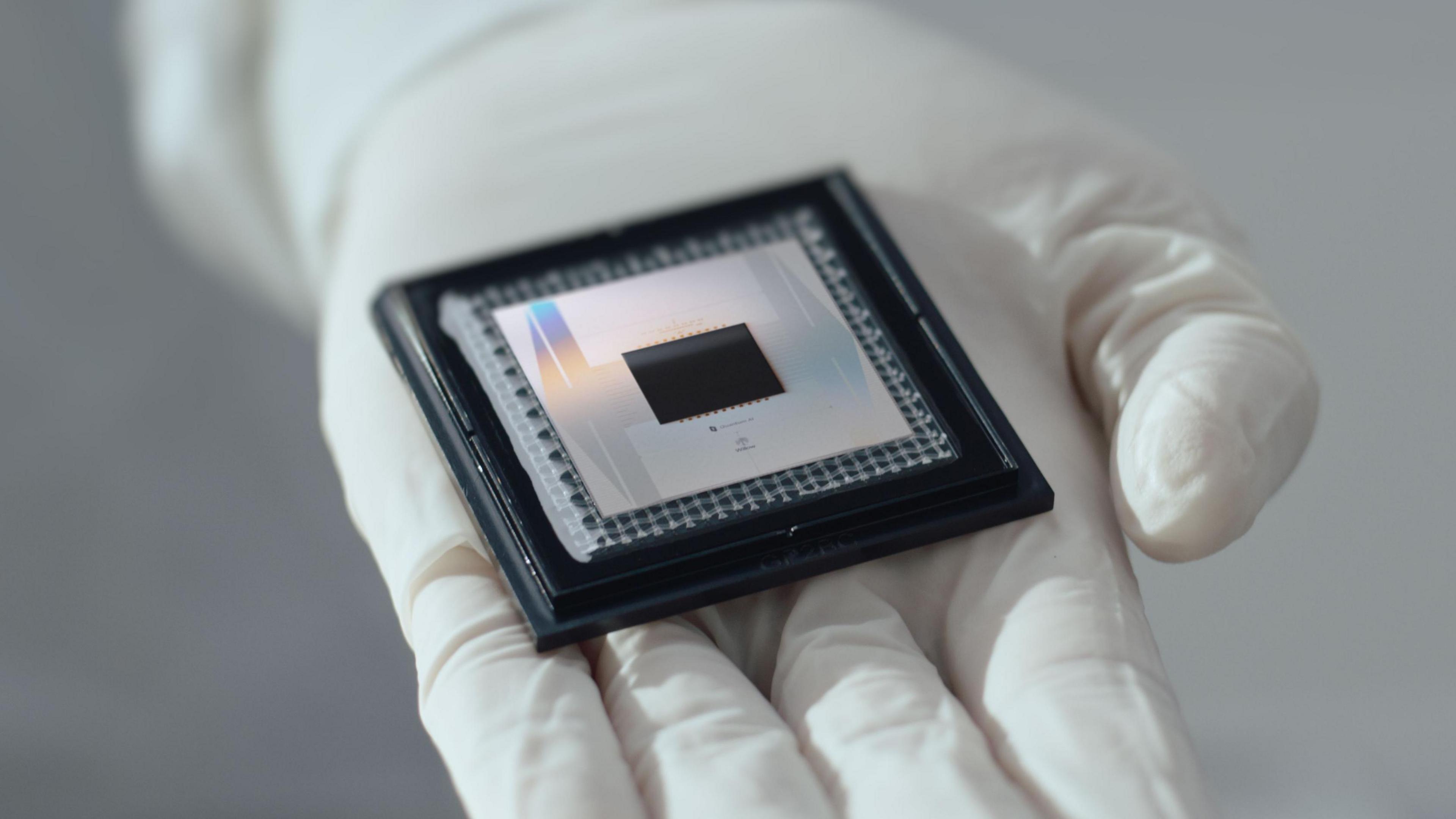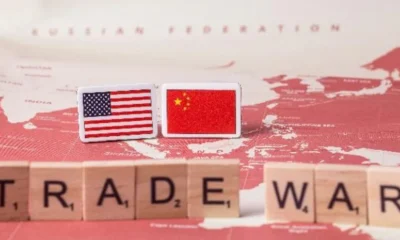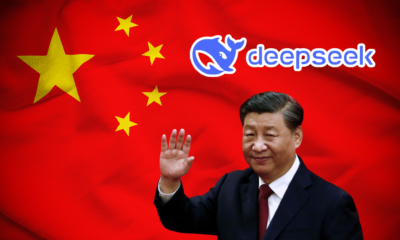Tech
Google’s Breakthrough in Quantum Computing: A New Chip. The Global Race, Why Quantum Computing Matters For Geopolitics? And The US-China Rivalry
Published
1 year agoon

Quantum computing—a phrase that sounds like it belongs in a sci-fi movie—is fast becoming one of the most sought-after technologies of the 21st century. On Monday, Google announced a groundbreaking advancement in the field: its new chip, Willow, has reportedly solved a computing problem in just five minutes that would take classical computers longer than the age of the universe. Let that sink in for a moment.
But what does this mean for us? Why is everyone—governments, corporations, and even the United Nations—so invested in the quantum race? And is it all good news?
The Global Quantum Race. A New Space Race?
Quantum computing isn’t just about faster processors; it’s about revolutionizing problem-solving in areas like medicine, artificial intelligence, and climate modeling. With such immense potential, nations like the US and China are locked in what could be described as a modern-day “arms race,” but instead of missiles, the focus is qubits.
While the technology is still experimental, no one can afford to lag behind. Quantum computers hold the promise of solving problems beyond the reach of today’s most powerful supercomputers. Imagine creating new medicines, designing advanced materials, or forecasting the planet’s climate decades in advance—all in a fraction of the time.
The stakes are so high that the United Nations has declared 2025 as the International Year of Quantum Science and Technology, urging global collaboration and awareness of quantum’s potential impact.
What’s So “Quantum” About Quantum?
If you’re wondering what makes quantum computing so special, you’re not alone. Quantum mechanics—the science underpinning this field—is notoriously bizarre. Concepts like entanglement (where two particles remain connected no matter how far apart they are) or Schrödinger’s cat (alive and dead until observed) challenge our traditional understanding of reality.
Quantum computers take this weirdness and channel it into groundbreaking technology. Instead of bits (the 1s and 0s used in classical computing), quantum computers use qubits, which can represent multiple states at once. This gives them the ability to perform certain calculations exponentially faster.

Google’s Willow Chip A Giant Leap Forward
Google’s Willow chip boasts 105 qubits, but here’s the catch: qubits are notoriously error-prone. Even a stray subatomic particle from outer space can disrupt them. Google claims to have tackled this challenge by improving quantum error correction—a game-changer that could make quantum computers not just faster, but also practical.
In a paper published in Nature, Google explained how its new chip reduces error rates even as more qubits are added—a critical milestone for scalable quantum computing. The company has also built a dedicated fabrication facility to accelerate the development of future chips, ensuring faster experimentation and innovation.
While some competitors have chips with more qubits, Google is focusing on quality over quantity. As Anthony Megrant, chief architect for Google Quantum AI, said, “If we have a good idea, we want somebody on the team to get it into the clean room and into one of these cryostats as fast as possible.”
The Global Quantum Computing Race
Quantum computing is the buzzword that leaves even tech-savvy minds scratching their heads. It’s one of those concepts where the more you learn, the more complex and mysterious it seems. After all, if even Albert Einstein found quantum mechanics baffling, the rest of us can be forgiven for struggling to grasp ideas like objects existing in two places at once.
Yet, here we are in the 2020s, witnessing a race involving governments, tech giants, and research institutions to build practical quantum computers. The stakes? Transformational breakthroughs in medicine, artificial intelligence, and even global security. But while the hype is real, the journey is far from over.
A Quantum Leap from Theory to Reality
Quantum physics became a recognized field in the 1960s, and by the 1980s, scientists began imagining its use in computing. Fast-forward to the 1990s, and the idea of quantum computers outperforming conventional ones was more than just science fiction. Algorithms were developed, software platforms designed, and by the 2000s, the push to build a reliable quantum computer was in full swing.
So, why does this matter? Conventional computers, powerful as they are, struggle with problems involving enormous variables—like modeling climate patterns, discovering new drugs, or breaking cryptographic codes. Quantum computers, with their ability to perform parallel calculations at lightning speed, offer solutions to these complex challenges.
By the 2010s, companies like Google and IBM were showcasing prototypes capable of performing tasks in minutes that would take classical supercomputers decades. While these experimental devices were nowhere near practical for everyday use, they proved that quantum computing was more than theoretical.
Quantum Hype Meets Real-World Challenges
Building a quantum computer is no small feat. It requires sophisticated infrastructure, materials that can operate at temperatures near absolute zero, and highly skilled teams of scientists. Tech giants such as Google, IBM, Amazon, and Microsoft have invested heavily in quantum R&D, as have governments around the world.
Startups also jumped on the bandwagon around 2021, with venture capital pouring billions into quantum computing initiatives. Even so, the field hit a funding dip in 2023, reflecting a cautious approach to a technology that remains expensive and unproven at scale.
Meanwhile, governments see quantum computing as a tool of economic and geopolitical power. The United States has launched a National Quantum Initiative, investing $5 billion across military, scientific, and civil sectors. China, however, is the clear leader in terms of spending, committing $15 billion to projects like its multibillion-dollar Quantum Lab. The EU, India, and Japan are also making billion-dollar bets on quantum R&D.

Why Is Everyone Racing?
The motivations are both economic and military. Economically, no nation wants to fall behind in a technology that could revolutionize industries. Militarily, the stakes are even higher. A functioning quantum computer could crack the encryption systems that protect global communications, military secrets, and financial transactions.
However, this brings its own set of risks. If one nation achieves quantum supremacy—a point where quantum computers outperform classical ones—the balance of power could shift dramatically, triggering new kinds of technological and geopolitical tensions.
Practical Use Cases and Lingering Doubts
For all the excitement, it’s important to temper expectations. Most quantum computers today are still experimental, and practical applications remain limited. While quantum computing could accelerate breakthroughs in fields like material science or pharmaceuticals, its usefulness for everyday tasks is negligible. Your email, online shopping, and social media will still rely on classical computers for the foreseeable future.
Moreover, military and intelligence applications may develop in secrecy, delaying broader commercial uses. History shows that secret technologies can take decades to trickle down into everyday life.
The Race for Quantum Supremacy: U.S. vs. China
Quantum computing, powered by the enigmatic principles of quantum mechanics, promises to revolutionize computational speed and power. Unlike classical computers, which process information in binary bits (0s and 1s), quantum computers use qubits that can exist in multiple states simultaneously, thanks to properties like superposition and entanglement. This ability allows quantum computers to process data millions of times faster than their classical counterparts.
This is the crux of the global race for quantum supremacy, where the stakes include national security, economic dominance, and technological superiority.
A Looming Threat. The Countdown to “Q-Day”
In February 2023, Quantum Defense (QD5), a Canadian cybersecurity firm, issued a dire warning to the U.S. Department of Defense. The company’s Executive Vice President, Tilo Kunz, cautioned that “Q-Day”—the moment quantum computers render current cryptographic systems obsolete—could arrive as early as 2025. If that happens, sensitive data such as healthcare records, military strategies, and state secrets could be exposed.
Kunz’s prediction added urgency to the already fierce competition to develop quantum technologies, both offensive and defensive. The implications stretch far beyond technology, potentially reshaping global power dynamics and modern defense strategies.
The U.S.: Harnessing the Power of the Private Sector
Historically, the United States has maintained a lead in the quantum computing race, driven by a combination of robust public funding, academic research, and private sector innovation. As early as the 1990s, the U.S. government recognized quantum computing’s transformative potential, laying the groundwork for future advancements.
Today, American tech titans such as IBM, Google, Amazon, Intel, and Microsoft are at the forefront of quantum innovation. With deep pockets and cutting-edge R&D teams, these companies are racing to push the boundaries of quantum capabilities and bring commercially viable systems to market.
According to GlobalData, the U.S. government has allocated $3 billion to quantum research, with an additional $1.2 billion provided under the National Quantum Computing Initiative. In 2022, President Joe Biden signed the CHIPS and Science Act, unlocking further funding for critical quantum research. These efforts underscore the U.S.’s commitment to staying ahead in this transformative technological race.
China, Ambitious and Centralized
While the U.S. has traditionally held the upper hand, China is emerging as a formidable competitor. With a top-down, state-driven approach, China plans to invest a staggering $15 billion in quantum computing over the next five years, dwarfing the U.S. government’s direct investments.
At the heart of China’s ambitions is the $10 billion National Quantum Laboratory, located at the University of Science and Technology of China. This lab serves as the epicenter for the nation’s quantum research, pooling expertise from across the country and leveraging China’s centralized funding system.
China’s strategy extends beyond computational power. The country is a leader in quantum communication, boasting groundbreaking projects like the Micius satellite and the Beijing-Shanghai Quantum Secure Communication Backbone, which offer unhackable communication systems.
The Faces and Innovations Behind the Race
In the U.S., quantum advancements are driven by a decentralized network of tech giants and academic institutions. Each player competes to deliver breakthroughs, fostering innovation but sometimes resulting in fragmented efforts.
In contrast, China’s centralized model provides a unified direction. Pan Jianwei, a renowned physicist and a national icon, leads much of China’s quantum progress. His work on quantum secure communications and the 2016 launch of Micius, the world’s first quantum satellite, has positioned China as a pioneer in secure quantum technologies.

Why Quantum Computing Matters for Geopolitics
The race to achieve quantum computing supremacy holds massive geopolitical significance, far beyond the realm of science and technology. The first nation to harness quantum dominance will gain a decisive edge in cyber warfare, intelligence gathering, and data security—especially as the looming “Q-Day” draws nearer.
For instance, China’s potential to leverage quantum technology poses a grave risk to the national security of the U.S. and its allies. If Beijing were to break encryption protocols and access decades of classified information, it could disrupt the West’s military and economic superiority.
Conversely, if the U.S. secures a lead in quantum computing, it could thwart China’s ambitions to become a global powerhouse, safeguarding its strategic interests amid an increasingly volatile geopolitical landscape.
The Post-Quantum Cryptography Race
Recognizing the stakes, the U.S. and its allies are racing to develop post-quantum cryptography (PQC)—a next-generation encryption standard designed to withstand the power of quantum computers. Since August 2022, the U.S. National Security Agency (NSA) has mandated organizations to adopt stricter security measures aligned with PQC standards.
The National Institute of Standards and Technology (NIST) has identified four PQC algorithms to guide the creation of these new standards, with an official post-quantum security framework expected to be rolled out by 2024.
While promising, these solutions are not without skeptics. Experts like Tilo Kunz from QD5 caution that as quantum computing continues to evolve, even PQC systems may eventually be compromised, leaving critical security challenges unresolved.
The Challenges of “Quantum Winter”
Despite significant breakthroughs, quantum computing faces formidable hurdles, leading some experts to predict a potential “quantum winter”—a period of stagnation and reduced investment, reminiscent of the AI winter of the 1970s and 1980s.
Isabel Al-Dhahir, Principal Analyst at GlobalData, warns that such a decline is plausible due to inflated expectations, slow progress, and extended timelines for commercial viability. Many quantum startups lack sustainable business models, which could deter investors and slow advancements.
Nevertheless, quantum computing remains a high-priority area for global powers, including the U.S., China, the EU, the UK, India, Canada, Japan, and Australia. The shared concern is clear: quantum computing could render existing security frameworks obsolete, posing serious risks to national and global stability.
The Last Bit
The race for quantum supremacy is about more than just technological bragging rights. A reliable quantum computer could unlock massive advancements in drug discovery, climate modeling, and artificial intelligence. More ominously, it could dismantle existing encryption systems, threatening global cybersecurity.
As the quantum race intensifies, humanity approaches a pivotal moment in history. The nation—or coalition—that wins this race will wield profound influence over scientific progress, economic competition, and global security.
The US and China are vying for dominance in quantum computing because of its potential applications in national security, including encryption-breaking capabilities and advanced simulations for defense technologies.
But this competition has its risks. A world divided by quantum capabilities could deepen existing tensions, and as with any transformative technology, misuse or monopolization is a genuine concern.
Despite technical and political obstacles, the potential benefits of quantum computing are extraordinary. From revolutionary advancements in artificial intelligence and materials science to breakthroughs in pharmaceuticals and cryptography, the possibilities are endless.
As “Q-Day” approaches, the choices made now will have far-reaching consequences for future generations.
You may like
-


Taiwan’s ‘Historic’ TSMC Deal, A Win Or The End Of Its ‘Silicon Shield’ As China Threatens? A Jittery Taiwan Watches Trump’s Moves On Ukraine, Wondering, Could We Be Next?
-


A Trade War That Just Won’t Quit. As Trump’s Tariffs Hit, China Stays The Course, For Xi’s Its Business As Usual Strategy
-


Indian Stock Market In Turmoil. Investors In Panic Mode, Is This A Temporary Correction Or The Start Of A Bear Market?
-


America And China’s Thirst For Gold In 2025 Is Draining Other Countries’ Reserves; Here’s Why?
-


Shakeup In The Auto Sector. Mercedes-Benz 15% Job Cuts, Nissan CEO Exit, And Germany’s Make-Or-Break Year
-


DeepSeek Ai Rush. China’s AI Contender Gears Up for Next Big Launch Even As It Gets Xi Jinping’s Blessings
